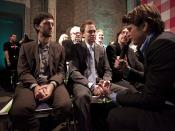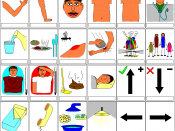Several elements compose the communication process, most models include the sender along with encoding, transmission, medium or channel, reception or receiver, decoding, and feedback (Peak, 2007, p.32).
ELEMENTSSENDER is one of the two or more people are always involved in communication, (Erven).
Significance The lack of communication is the cause of personal and world strife.
The process starts with a sender or communicator speaker, issuer or writer is responsible for a message to express for a receiver (Erven). The communicator's attitude must be positive. The communicator's selection of meaningful symbols, or selecting the right symbols depending on your audience and the right environment (Communication).
ContributesThe sender and receiver must have a positive attitude about communication and increased awareness of the potential for improving communication which is the first step to better communication (Erven).
DetractsThe lack of communication is the cause of personal and world strife. Defensiveness also interferes with communication (Erven).
MisinterpretationThe point from where the message originated, e.g. the boss, is the sender. The action intended to happen out of this message is convening of a meeting urgently, but definitely not the next day morning as the secretary scheduled it (Meesala). Failure to specify a time in this instance was failure to communicate.
ENCODING is the idea or intention or message (Meesala). translated or converted into symbols e.g. words or signals (Meesala). A message is what needs to be communicated (Lizotte, 2008) in writing, in speech, Talking, speaking, pictures, symbols, diagrams, charts, or signals (Communication). Non-verbal communication, popularly referred to as body language, relies primarily on seeing rather than hearing (Erven). Encoding the office meeting has been converted into words, probably with facial expressions signaling the urgency of meeting. Such process of converting an idea is words or expressions is encoding (Meesala). It is the verbal and non-verbal convention...


